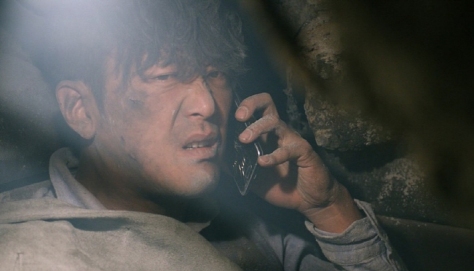By Dennis Hartley
(Originally posted on Digby’s Hullabaloo on September 25, 2016)

“If you want to keep a secret, you must also hide it from yourself.”
-from “1984”, by George Orwell
Reality can be a tough act to follow. As I noted in my 2008 review of the biopic, W:
No one has ever accused Oliver Stone of being subtle. However, once audiences view his highly anticipated film concerning the life and times of George W. Bush, I think the popular perception about the director, which is that he is a rabid conspiracy theorist who rewrites history via Grand Guignol-fueled cinematic polemics, could begin to diminish.
If the Bush administration had never really happened, and this was a completely fictional creation, I would be describing Stone’s film by throwing out one-sheet ready superlatives […] But you see, when it comes to the life and legacy of one George W. Bush and the Strangelovian nightmare that he and his cohorts have plunged this once great nation into for the last eight years, all you have to do is tell the truth…and pass the popcorn.
Such is the conundrum for Snowden, writer-director Oliver Stone’s new biopic about Edward Snowden, the former National Security Agency subcontractor who ignited an international political firestorm (and became a wanted fugitive) when he leaked top secret information to The Guardian back in 2013 regarding certain NSA surveillance practices.
The “tough act of follow” is Laura Poitras’ Oscar-winning 2014 documentary, Citizenfour. In 2013, Snowden invited Poitras, along with Guardian journalists Glenn Greenwald and Ewen MacAskill, for a meet at the Hong Kong hotel he was holed up in. This was the culmination of months of email exchanges between Snowden (sending encrypted text under the pseudonym of “Citizenfour”) and Poitras. Poitras found herself in the unique position of being a (circumstantial) “co-conspirator” in the story she was filming. The result was a gripping documentary that played like a paranoia-fueled thriller.
Now we have Oliver Stone, a filmmaker often accused by detractors of infusing his own politically charged, paranoia-fueled conspiracy theories into historical dramas like JFK and Nixon, diving head first into one of the most polarizing public debates of recent years: is Edward Snowden a hero…or a traitor? It seems to be a marriage made in heaven. Surely, this should be a perfect impetus for the return of that fearless, rabble-rousing Oliver Stone of old…speaking truth to power through his art, consequences be damned.
This is actually a surprisingly restrained dramatization by Stone, which is not to say it is a weak one. In fact, quite the contrary-this time out, Stone had no need to take a magical trip to the wrong side of the wardrobe. That’s because the Orwellian machinations (casually conducted on a daily basis by our government) that came to light after Snowden lifted up the rock are beyond even the most feverish imaginings of the tin foil hat society.
In other words, you couldn’t make this shit up, either.
After opening with a cloak-and-dagger vignette set in 2013 on the streets of Hong Kong, Stone flashes back to 2004, where we see a younger, gung-ho Edward Snowden (Joseph Gordon-Levitt) humping it through a grueling Special Forces training course. His Army reservist career is cut short after he breaks both legs in an accident. A few years later, still determined to serve his country, he finds a more ideal fit working at the CIA, where his (apparently) sharp computer hacking skills land him a position as an info tech. Stone follows Snowden’s various job relocations, from D.C. to Japan; eventually ending up at the NSA subcontracting firm Booz Allen in Hawaii (where he famously “did the deed”).
Stone alternates between the personal bio, which includes Snowden’s longtime relationship with his girlfriend Lindsay Mills (Shailene Woodley) and the increasingly furtive interview sessions with Snowden in the Hong Kong hotel room in 2013 by Guardian journalists Greenwald (Zachary Quinto) and MacAskill (Tom Wilkinson), while Poitras (Melissa Leo) dutifully continues filming. Gordon-Levitt uncannily captures Snowden’s vibe; although by the time credits roll, he remains a cypher. Then again, Snowden has said, “This really isn’t about me […] It’s about our right to dissent.”
Stylistically, the film felt to me like a throwback to cerebral cold war thrillers from the 1960s like The Spy Who Came in From the Cold, The Defector, Funeral in Berlin, and The Deadly Affair. This may not be by accident; because one of the core themes of the screenplay (adapted by Stone with Kieran Fitzgerald from Luke Harding’s The Snowden Files: The Inside Story of the World’s Most Wanted Man, and Anatoly Kucherena’s Time of the Octopus) is that we are, in fact, in the midst of a new “cold war”…in cyberspace.
As Snowden’s (fictional) mentor “Corbin O’Brien” (one of the more interesting creations in the film, especially as played by a scene-stealing Rhys Ifans) tells him, “The new battlefield is everywhere.” True that. It’s happening every day, all around us. It used to be a novelty, but it seems like my bank is issuing me a new credit card about every 6 months anymore, due to some nebulous “security breach”. Or how about the “DC Leaks” story…hacktivists with alleged Russian ties breaking into White House accounts at will?
But the question becomes, of course, how much of our privacy should we, as tax-paying citizens, be willing to sacrifice in the name of national security? As Greg Lake once sang:
Knowledge is a deadly friend, if no one sets the rules The fate of all mankind, I see, is in the hands of fools
Luckily, we have filmmakers like Stone and Poitras, journalists like Greenwald and MacAskill, and whistle blowers like Edward Snowden, who do not suffer such fools gladly. Big Brother is watching us, but now we feel emboldened to ask: What are you lookin’ at?











